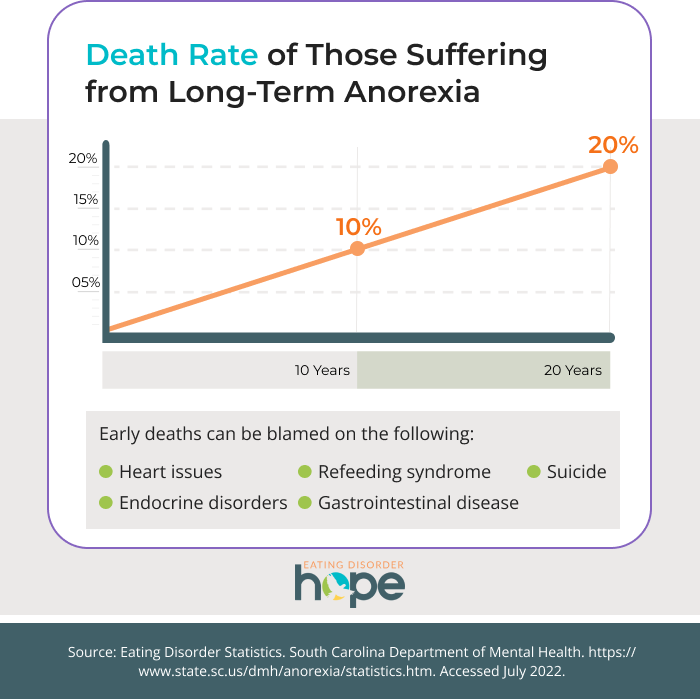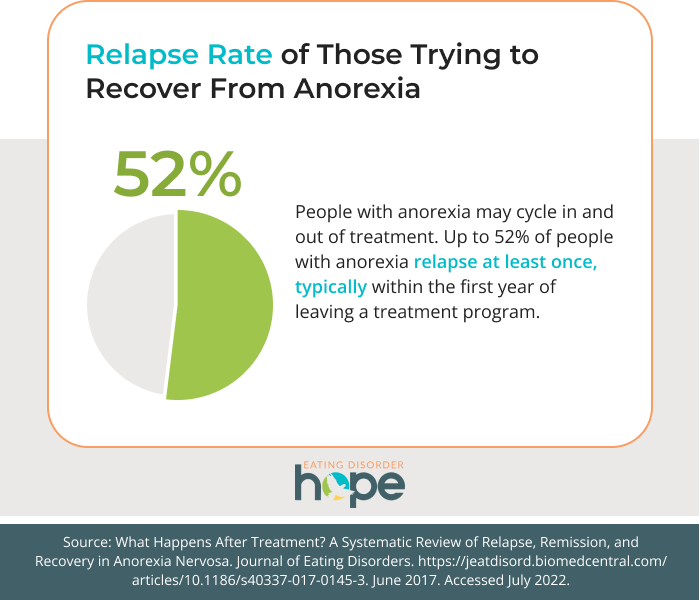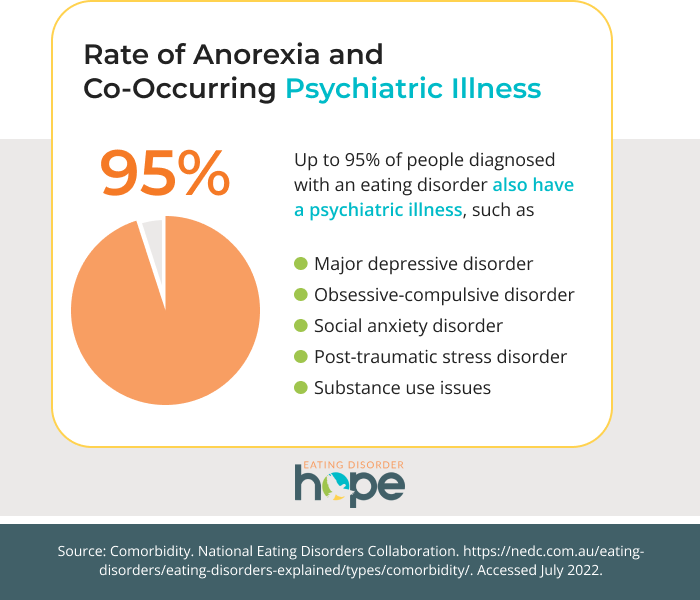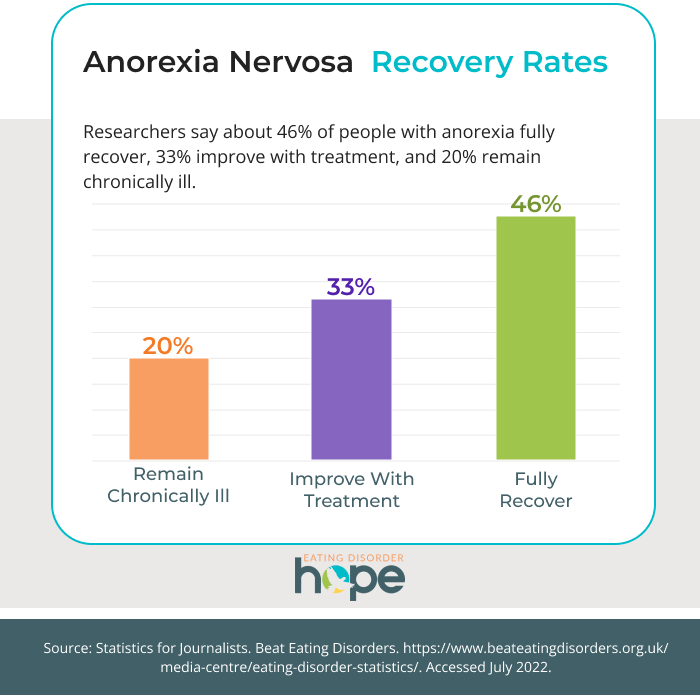- Calls to this hotline are currently being directed to Within Health or Eating Disorder Solutions
- Representatives are standing by 24/7 to help answer your questions
- All calls are confidential and HIPAA compliant
- There is no obligation or cost to call
- Eating Disorder Hope does not receive any commissions or fees dependent upon which provider you select
- Additional treatment providers are located on our directory or samhsa.gov
Anorexia Nervosa – Highest Mortality Rate of Any Mental Disorder: Why?
Anorexia is a deadly disease. In fact, experts suggest it’s one of the most dangerous illnesses that can impact men and women.
Up to 10% of people with anorexia die within about 10 years of getting the disease, and up to 20% will die after 20 years.[1]
Early deaths can be blamed on the following:
- Heart issues
- Endocrine disorders
- Gastrointestinal disease
- Refeeding syndrome
- Suicide

People who are treated and relapse, as well as people with other health issues in addition to suicide, have an increased risk of problems.
Treatment can help, but finding the right program is critical. For example, people with anorexia treated in outpatient programs have double the risk of early death when compared to the general population.[2]
Respect anorexia and do your part to find the right program and follow its recommendations carefully.
5 Ways Anorexia Leads to Death
How common is death from anorexia? Unfortunately, it’s more common than any mental health professional would like.
Starvation takes its toll on people with anorexia. Many vital systems are disrupted. In time, people can die from the damage.
These are five common issues associated with early death from anorexia:
1. Cardiovascular Disease
About a third of all deaths associated with anorexia are due to heart damage. Typically, people with anorexia die suddenly when their hearts no longer work properly.[3]
All muscles in your body shrink due to starvation, including your heart. A small, weak heart can’t pump blood effectively, allowing clots to form. A clot stuck in your heart can cause a heart attack and sudden death.
Severe weight loss causes other negative effects on the heart. The heart muscle gets smaller in size, the mitral valve may prolapse, heart rate slows, and blood pressure decreases.
Fluid can accumulate in the sac around the heart muscle, known as pericarditis. Irregular heart rhythms, known as arrhythmias, can also occur and may even cause sudden death.
2. Endocrine Disorders
Hormones and electrical impulses make most of your organs function normally, and they keep your immune system going strong. Endocrine disorders alter these important tasks.
An endocrine system weakened by anorexia can lead to the following:[4]
- Low energy: You may not be able to exercise, and in late stages, you may sleep almost all of the time.
- Low growth hormone: If you develop anorexia during adolescence, you may never reach your full height.
- High stress levels: Your body produces cortisol in response to starvation, making you feel jittery all the time.
- Low thyroid: Your appetite and mood are altered when this organ isn’t working well.
- Poor kidney function: These organs help filter fluid from your body. When they are damaged, you can retain water.
3. Gastrointestinal Disease
People with anorexia may eat very little, but their digestive tract is still working. Some people with anorexia develop heartburn, chest pain, and other symptoms of upper gastrointestinal disease.[5]
The gastrointestinal system experiences slowing of the GI muscles, delayed gastric emptying, constipation, impaired colonic transit time, and possible hepatitis. There can be more complications if purging behaviors occur.
Purging by vomiting can cause erosion of tooth enamel and destruction of esophageal tissue with possible tears and bleeding. It can even cause a ruptured esophagus or changes to the tissue lining that increase the risk for esophageal cancer (called Barrett’s esophagus).
Purging via laxative abuse can cause damage to muscles in the colon.
4. Refeeding Syndrome
People with anorexia need to gain weight to feel better. But if they eat large amounts too quickly, they can develop hormonal and metabolic changes, leading to heart problems and death.[6]
Cardiovascular collapse can occur with refeeding of the body because it is difficult for the smaller heart muscle to handle the increase in blood volume seen with refeeding. This can result in heart failure.
The first few weeks of refeeding the body require close monitoring of the cardiovascular system by health care providers.
A treatment program made for people with anorexia can help. Experts here know how to avoid refeeding problems.
5. Suicide
Experts believe more people with anorexia die of suicide than starvation.[7]
Life with a chronic condition isn’t easy, and some people with anorexia develop the persistent belief that they will never get better. To them, suicide seems like a better way out.
The Role of Relapse in the Anorexia Death Rate
People with anorexia may cycle in and out of treatment. Each time, they do more damage to delicate systems.
Up to 52% of people with anorexia relapse at least once, typically within the first year of leaving a treatment program.[8] A body that seesaws between a healthy and unhealthy weight can be severely damaged.
If the person doesn’t leave space between relapses, some organs (like the heart) don’t have the chance to heal fully. They are repeatedly damaged before they can recover.
Anorexia is a chronic condition, and relapse is part of the healing process for many. But people who can’t stop the cycle of treatment and relapse could do a significant amount of damage to their bodies.

Do Underlying Conditions Play a Role in the Anorexia Mortality Rate?
Up to 95% of people diagnosed with an eating disorder also have a psychiatric illness, such as these:[9]
- Major depressive disorder
- Obsessive-compulsive disorder
- Social anxiety disorder
- Post-traumatic stress disorder
- Substance use issues
An underlying mental health problem complicates the path to recovery. These comorbid conditions can further complicate treatment and the ability of the patient to make progress toward recovery.
Support systems, access to care, and a reduction of triggering factors involved with anorexia nervosa are all vital for a patient to make progress versus spiraling into life-threatening situations and complications.

Effective Anorexia Treatment Programs to Lower Your Risk
The anorexia death rate is the highest of all mental illnesses as it is a very complex and complicated disorder. It requires early diagnosis and access to care with close follow-up and often long-term treatment.
Each patient’s risk must be evaluated individually. Their risk is affected by the extent of their food restriction and the degree and combination of any purging behaviors.
Researchers say about 46% of people with anorexia fully recover, and 33% improve with treatment.[10]
Finding a program that supports you as an individual, and offers tailored treatments to address your challenges and strengths, is critical to your survival. Find the help you need, and you can get better.

References
- Eating Disorder Statistics. South Carolina Department of Mental Health. https://www.state.sc.us/dmh/anorexia/statistics.htm. Accessed July 2022.
- Review of the Burden of Eating Disorders: Mortality, Disability, Costs, Quality of Life, and Family Burden. Current Opinion in Psychiatry. https://www.ncbi.nlm.nih.gov/pmc/articles/PMC7575017/. August 2020. Accessed July 2022.
- Cardiovascular Impact of Eating Disorders in Adults: A Single Center Experience and Literature Review. Heart Views. https://www.ncbi.nlm.nih.gov/pmc/articles/PMC4590190/. July 2015. Accessed July 2022.
- The Endocrine Manifestations of Anorexia Nervosa: Mechanisms and Management. Nature Reviews Endocrinology. https://www.ncbi.nlm.nih.gov/pmc/articles/PMC5998335/. June 2018. Accessed July 2022.
- Eating Disorders and Gastrointestinal Diseases. Nutrients. https://www.ncbi.nlm.nih.gov/pmc/articles/PMC6950592/. December 2019. Accessed July 2022.
- Refeeding Syndrome as Treatment Complication of Anorexia Nervosa. Psychiatria Polska. https://pubmed.ncbi.nlm.nih.gov/31955189/. October 2019. Accessed July 2022.
- What Is the Prognosis of Anorexia Nervosa? Medscape. https://www.medscape.com/answers/912187-165661/what-is-the-prognosis-of-anorexia-nervosa. June 2019. Accessed July 2022.
- What Happens After Treatment? A Systematic Review of Relapse, Remission, and Recovery in Anorexia Nervosa. Journal of Eating Disorders. https://jeatdisord.biomedcentral.com/articles/10.1186/s40337-017-0145-3. June 2017. Accessed July 2022.
- Comorbidity. National Eating Disorders Collaboration. https://nedc.com.au/eating-disorders/eating-disorders-explained/types/comorbidity/. Accessed July 2022.
- Statistics for Journalists. Beat Eating Disorders. https://www.beateatingdisorders.org.uk/media-centre/eating-disorder-statistics/. Accessed July 2022.
Articles on Anorexia
- Refeeding Patients with Anorexia Nervosa: What Does Research Show?
- Anorexia and Amenorrhea: What are the Consequences?
- Anorexia and Medication: What Helps?
- Anorexia and Nutrition – Nutrients are Essential in Recovery
- Anorexia and Alcohol
- Anorexia and Co-Occurring Issues Make Treatment Challenging
- Food Obsessions and the Brain: Understanding the Neuroscience of Appetite for Anorexia Nervosa
- Anorexia and the Brain: What Do We Know?
- Instant (Chemical) Messenger: Anorexia and the Chemical Communication of the Brain
- Understanding Anorexia Treatment: What to Expect During the First Week in Residential Treatment
